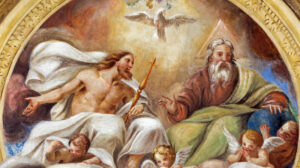Fr Neil’s homily on Trinity Sunday, 12 June 2022
The spirit you received is not the spirit of a slave bringing fear into your lives again; it is the spirit of sons, and it makes us cry out, Abba, Father!¹
If we have learnt nothing else over the Covid lockdown we have become only too aware of our need as human beings to be in social contact with others, especially our loved ones.
The extent of the mental health crisis from the extended lockdowns is yet to be fully realised. To properly function as a human being requires us to be in relationship with others where we are able to share our stories, solve problems, laugh, cry and be held. Community and intimacy are essential.
In the first creation account of man, there is a deliberate use of the plural when God refers to himself.
Then God said, “Let us make man in our image, after our likeness…” So God created man in his own image, in the image of God he created him; male and female he created them.²
Man is not created alone, but “male and female he created them.” A community is already established for humanity to reflect the image of God our Creator.
In the second creation account³ we hear God stating; “It is not good that the man should be alone,” and then on the creation of the woman, Adam cries out in joy for he is now complete in communion with the woman: “This at last is bone of my bones and flesh of my flesh.” This joy is borne of that part of us which reflects the internal relationship of the Trinity in whose image we are made.
This internal relationship of the Trinity is clearly indicated in Christ’s emphasis on his relationship with God the Father.
However, although it was not unknown to refer to God as Father in the Old Testament, it was rare and unusual. Far more common is the formal term Lord for the sacred name of God. Christ, however, refers to the Father more times in the Sermon on the Mount that does whole of the Old Testament put together. That might not be surprising given that he is the Son of God, yet a central tenet of his teaching of the disciples is the manner in which they are encouraged to refer to God as Father. When the disciples ask Christ to teach them how to pray he begins by saying, “Our Father, who art in heaven…” This level of intimate language in relationship to God is a means of inducting the disciples into the heart of the Trinity.
The term ‘Abba, Father’ is used only twice in the New Testament, in our text at Romans 8:15, and Mark 14:36 while Jesus is in anguish in the garden of Gethsemane. ‘He said, “Abba, Father, all things are possible to you; remove this chalice from me; yet not what I will, but what you will.”’ Despite a common misconception, Abba does not mean the childlike address ‘Daddy’ but is just the Aramaic word for Father.
The fact that it appears on Jesus’ lips in Mark’s Gospel tells us two things. First, in distress Christ reverts to Aramaic as he cries out to God the Father. The second is that the Gospel of Mark is Peter’s account for the benefit of the Christians in Rome, who by implication, are familiar with Aramaic as the language of Christ whom they imitate in prayer. Praying the words of Jesus aids the desire as disciples to follow in the way of Christ — to seek to live as he did allowing the Spirit of Christ to manifest itself in our behaviour.
Why does Paul use this same Aramaic word in this passage from Romans? Could it be that the church in Rome is also going through a time of great anguish and persecution? Paul reminds them that it is not fear that should dominate them as they have the spirit of Christ within them that allows them to cry out ‘Abba, Father.’ If then the spirit of Christ is in us then we are children of God and co-heirs with Christ.⁴ It reminds them that we are called to share in Christ suffering that we might be able to also share in his glory.
This inheritance is a call into the Kingdom of God as citizens of heaven. The Holy Spirit unites us to Christ and enables us to call God our Father, and miraculously to participate in the life of the Godhead. As Christ has ascended back into the glory of heaven at the right hand of the Father, so our sharing in his ‘Corpus Christi’ in the Eucharistic sacrifice assures us that where he has gone we shall, by his grace and mercy, follow.
The intimacy between Father, Son and Holy Spirit reveals a dynamic relationship of love into which we are called to participate and to which we are called to bear witness. We are healed, forgiven, never alone; we always belong and are forever loved, despite what this world might throw at us. Extraordinarily and wonderfully, in the Spirit we can call God our Father.
As we are transformed by the dynamic loving community of the Trinity so we are to draw others into such love by the unity and love we embody. In baptism we die with Christ to this fallen world, that we might rise with Christ into this divine family of love. This is how we gain eternal life.
Just as Christ, in loving obedience to the Father, reached out to the lost in his Incarnation and Passion, so we likewise, out of love, are sent by Christ to make disciples of all nations, baptising them into a rebirth from death to life in the divine dynamic love of the Godhead. One God, three Persons: Father Son and Holy Spirit.
¹ Romans 8:15
² Genesis 1:26, 27
³ Genesis 2:4–25
⁴ Romans 8:17








 Posts
Posts